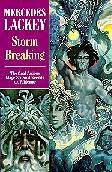The city of Merina is rich and undefended, and falls prey to the conquering Emperor Balthasar, his dark mage Apolon, and his heir Leopold. The dowager queen Adele, her daughter queen Lydana, and the heir Shelyra surrender the city to save it from destruction, but go underground to fight back against the conquerors.
Ho hum. I said the Eight Dreadful Words on page 179, and stopped reading, when I got too bored just waiting for something to happen. By this stage we've had lots of background introductory material, on the three Merinan women, the three enemy men, and various other 'colourful' characters. But that's all we've had (apart from a little heavy-handed foreshadowing about evil gems), it's nearly half-way into the book, and I'm bored.
Maybe the problem is that each of the three writers has provided one book's worth of build-up, all lumped together? Or maybe the problem is that I don't like the kind of plot structure where things get worse, and worse, and worse, and ... until, finally, the characters do something. Maybe the writers are trying to draw a picture of a situation so bad that even the 'ordinary' folk will revolt; I'm just sitting there saying "what are you waiting for: fight back, dammit!"








































